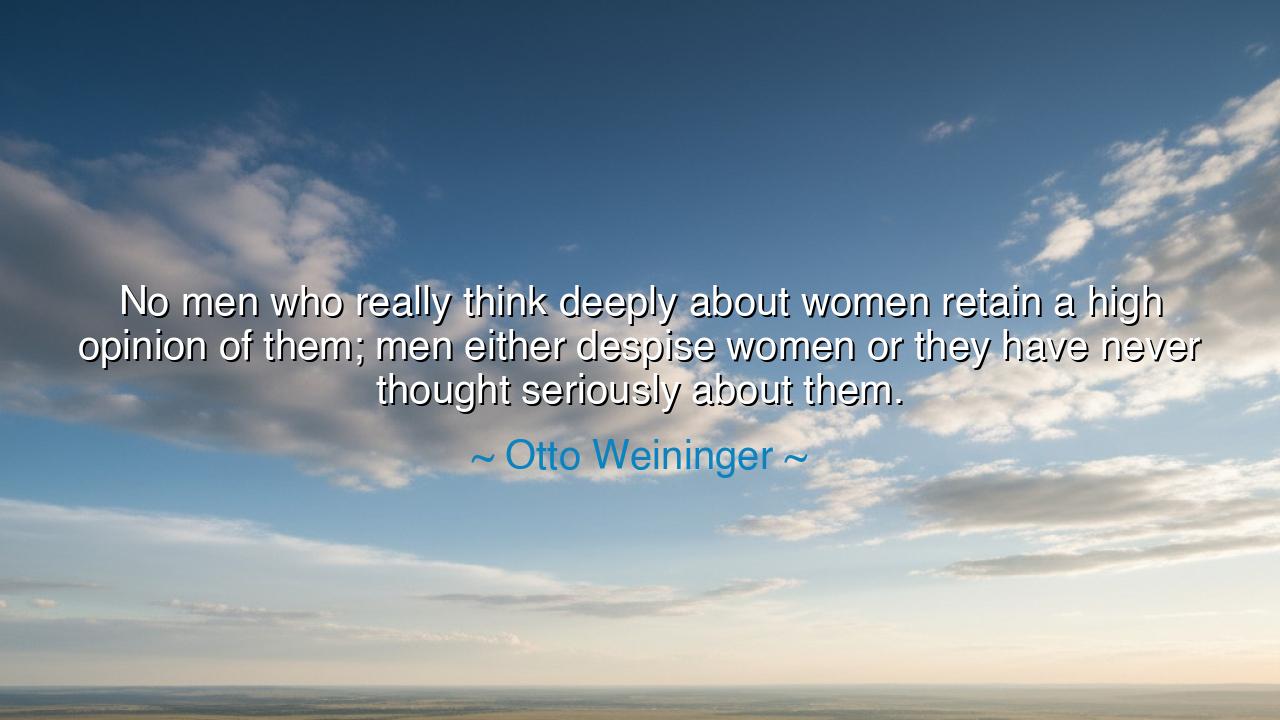
No men who really think deeply about women retain a high opinion
No men who really think deeply about women retain a high opinion of them; men either despise women or they have never thought seriously about them.






Otto Weininger, a soul tormented by his own contradictions, declared with bitterness: “No men who really think deeply about women retain a high opinion of them; men either despise women or they have never thought seriously about them.” These words, harsh and searing, spring from his 1903 work Sex and Character, a text written by one who wrestled with the very foundations of gender, identity, and human worth. His statement is not gentle philosophy but a wound bared to the world, reflecting both the prejudices of his age and the turmoil within his own heart.
At its surface, the quote speaks of disillusionment—that the man who turns his gaze upon women with the full weight of inquiry and judgment will find only disappointment, for he measures them not as individuals but as a category, weighed against ideals and abstractions. It is a view steeped in despair, not in truth, for it denies the complexity of human beings and reduces them to shadows of thought. To “think deeply” in this sense, as Weininger frames it, is not true wisdom but a distortion—an attempt to box the infinite within the narrow confines of the philosopher’s cynicism.
Consider how this sentiment has echoed through history. Many thinkers, from Schopenhauer to Nietzsche, cast words of scorn upon women, often more as reflections of their own struggles than of reality. Yet their scorn has never silenced the lives of great women who stood as living contradictions to such despair. Hypatia of Alexandria, burned by the mob yet remembered as a philosopher and mathematician of brilliance, proves that to despise women wholesale is to blind oneself to truth. Joan of Arc, who rose from obscurity to lead armies, stands as another eternal rebuke to the narrow gaze that sees only frailty where there is also fire.
Weininger’s tragedy was his inability to reconcile the fullness of human nature. He could not see that strength and weakness, wisdom and folly, passion and restraint belong to both men and women, and that to despise one half of humanity is to despise half of existence itself. His words, then, should be read not as the wisdom of an elder but as the caution of one consumed by despair. For philosophy without love becomes a weapon; thought without compassion turns bitter.
The lesson for us is clear: be wary of philosophies that divide mankind into absolutes, that seek to exalt one half while degrading the other. True thought does not end in contempt, but in humility. To “think deeply” about women, or about men, or about any people, is not to reduce them to abstractions, but to encounter them as living, breathing souls, each bearing both light and shadow. To stop at despising is not depth—it is failure.
In your own life, remember this: do not confuse cynicism with wisdom. It is easy to despise, easy to declare whole groups unworthy; it is harder to see their complexity, to honor both their flaws and their greatness. Practical action means listening without prejudice, observing with compassion, and refusing to let the bitterness of others poison your own gaze. Every person you meet is larger than the category they are forced into.
So let Weininger’s words stand not as a guide but as a warning. They teach us what happens when thought is divorced from love, when philosophy forgets compassion, when the mind hardens against the beauty of the human whole. The ancients taught that wisdom is not only knowledge but also harmony—the joining of intellect and heart. Therefore, O listener, think deeply, yes—but let your deep thought lead not to contempt, but to reverence. For only in reverence do we truly honor the mystery of humanity.






AAdministratorAdministrator
Welcome, honored guests. Please leave a comment, we will respond soon